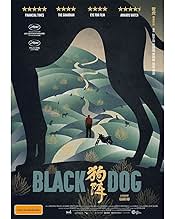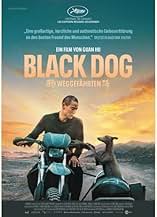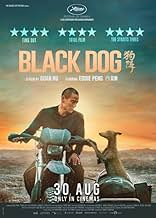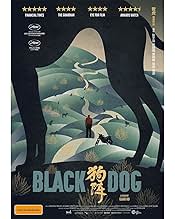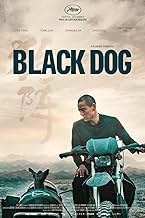De vuelta en China tras cumplir su condena, Lang se une a una brigada que captura perros previo a los Juegos Olímpicos de 2008. Sin embargo, establece una conexión especial con un perro call... Leer todoDe vuelta en China tras cumplir su condena, Lang se une a una brigada que captura perros previo a los Juegos Olímpicos de 2008. Sin embargo, establece una conexión especial con un perro callejero, convirtiéndose en compañeros de viaje.De vuelta en China tras cumplir su condena, Lang se une a una brigada que captura perros previo a los Juegos Olímpicos de 2008. Sin embargo, establece una conexión especial con un perro callejero, convirtiéndose en compañeros de viaje.
- Premios
- 16 premios ganados y 21 nominaciones en total
Opiniones destacadas
This movie is not what I have expected. I was forced to sit through it with a very uninteresting viewing experience. The screen play is quite boring, loosely knitted together with no energy, no steam at all, but just a lifeless narration. What we saw in this movie is a dying town in the northern China, the livelihood is totally gone after the mining business died. What left is a pathetic town with so many ruined and empty buildings, just like what we saw in Flint, Indiana. The leading character, the protagonist as movie critics or veteran reviewers used to describe, Peng, seems to be an bad choice for such ex-con character, a complete out-of-the-place actor to play this role. His dialogue in this movie is minimum in order to portray that this guy is a loner who belongs to nowhere, even in prison, albeit his so-called hometown. There is not much to tell in this movie, and I really failed to see how the director of this movie would have won some nominations as the best director. Maybe less is more is the current trendy. Making a black stray dog as the co-acting role is just not interested enough to stimulate my urge that would give me any passion or empanthy to the whole storyline. I felt quite impatient when I watched this movie. All of the characters who appeared in this movie, those folks, young or old, cops or civilians who tried to get by in a dying town are interested enough, just like their boring dialogue to each other, to the leading role who looked more like a half dumb or deaf person. If a town is dying, if all the town folks are poor, if all of them lose hope, if their daily lives are all so boring, what would enable to make a movie interesting? Even you put a seasoned actor like Peng to play the leading character, how much he could possibly make this boring town with so many boring town folks become a bit more interesting? A spiritless young man and a black stray dog is as boring as Hemingway's "The Old Man and The Sea", other than somewhat literary values that usually was glorified as "Literature". Trying to tell you that "Black Dog" has certain philosophic depth is just a pretentious view that tries to look deep. How could you get anything out of nothing?
Black Dog is a hauntingly beautiful exploration of human resilience and the complexities of morality. Directed with remarkable subtlety, the film masterfully blends psychological depth with poetic storytelling, creating an experience that lingers long after the credits roll.
The strength of Black Dog lies in its characters. Each one is richly drawn, with motivations and struggles that feel deeply authentic. The protagonist's journey is portrayed with such raw vulnerability that it's impossible not to empathize, even as their decisions veer into morally ambiguous territory. The supporting cast elevates the narrative further, delivering performances that are understated yet profoundly affecting.
Visually, the film is a masterpiece. The cinematography captures both the starkness and the beauty of the settings, using light and shadow to evoke an atmosphere of tension and melancholy. The use of symbolism is subtle but powerful, adding layers of meaning without feeling forced or pretentious.
The pacing is deliberate but never dull, allowing the story to unfold organically. This measured approach heightens the emotional impact, drawing the audience deeper into the characters' world. The soundtrack, too, deserves special mention-it complements the narrative perfectly, blending traditional and modern elements to underscore key moments.
At its core, Black Dog is a meditation on survival and redemption. It challenges viewers to confront uncomfortable truths about human nature while offering a glimmer of hope amidst the darkness.
The strength of Black Dog lies in its characters. Each one is richly drawn, with motivations and struggles that feel deeply authentic. The protagonist's journey is portrayed with such raw vulnerability that it's impossible not to empathize, even as their decisions veer into morally ambiguous territory. The supporting cast elevates the narrative further, delivering performances that are understated yet profoundly affecting.
Visually, the film is a masterpiece. The cinematography captures both the starkness and the beauty of the settings, using light and shadow to evoke an atmosphere of tension and melancholy. The use of symbolism is subtle but powerful, adding layers of meaning without feeling forced or pretentious.
The pacing is deliberate but never dull, allowing the story to unfold organically. This measured approach heightens the emotional impact, drawing the audience deeper into the characters' world. The soundtrack, too, deserves special mention-it complements the narrative perfectly, blending traditional and modern elements to underscore key moments.
At its core, Black Dog is a meditation on survival and redemption. It challenges viewers to confront uncomfortable truths about human nature while offering a glimmer of hope amidst the darkness.
I had no idea idea what to expect when I saw this movie. It was slow moving but fully engrossing. It is set amongst a somewhat grim environment but really opened my eyes to how people exist in some parts of China. It is an austere existence, barren and treeless yet the town is gearing up for the 2008 Beijing Olympics with propaganda blasted over the loudspeakers in true communist China fashion.
Although it is a sobering film, there are several parts that are quite humorous and while it isn't heavy on dialogue, it is what NOT is said that makes you think.
I can see what this was a winner at CANNES.
Although it is a sobering film, there are several parts that are quite humorous and while it isn't heavy on dialogue, it is what NOT is said that makes you think.
I can see what this was a winner at CANNES.
Many films about the special relationship between man and his four-legged best friend have been made over the years, and it's a formula that nearly always manages to please. So it is with the latest offering from writer-director Guan Hu, the story of a former inmate who's been paroled to his hometown on the fringe of the Gobi Desert in northwestern China after 10 years in prison for a manslaughter conviction, an incident in which he had apparently become unwittingly involved. As he seeks to make amends for his past and start his life over, former motorcycle stunt artist/musician Lang Yonghui (Eddie Peng) returns to his roots as China had become engaged in an aggressive, ongoing national program of upgrading its infrastructure in preparation for the 2008 Beijing Olympics. In this case, this undertaking is a much-needed improvement for a faltering community that has become seriously run down and depopulated. And that exodus, in turn, has created a secondary problem: as many former residents departed, they abandoned their pets (especially dogs), creating a population of strays that has now ballooned to overwhelming proportions. Given this preponderance of feral canines - many of whom have become unruly, vicious and a public health risk - local authorities are in desperate need of help in rounding them up. In light of that, as part of Lang's government-sanctioned reintegration program, he is assigned to a job in animal control. But, as something of an unassuming soft touch, he struggles to carry out his duties. That becomes particularly true when he's charged with corralling a gaunt, mangy, assertively territorial black dog (Xin) suspected of having rabies, a scenario that leads to a decidedly belligerent confrontation between man and beast. However, once the stray is in custody, Lang and his captive begin developing an unexpectedly close bond. Lang ends up adopting the pooch, and they thus embark on an odyssey of self-discovery for themselves and one another as they work through issues of their own making and the exploration of their newfound relationship. The result is a heartwarming tale filled with genuine affection and loving mutual support, admittedly sometimes a tad obvious in their depiction but undoubtedly always sincere to the core. The narrative truly works best when it focuses on this primary relationship, a story thread that, regrettably, is sometimes intruded upon a little too much by an array of subplots whose variable, sometimes under-explained development and occasionally meandering nature can detract from what works best. Nevertheless, these minor distractions aside, "Black Dog" is an otherwise-engaging, enjoyable saga of two outcasts in search of redemption and the wonders that the power of friendship can work for those looking to get their lives back on track. But, then, that's why our four-legged furry companions have deservedly earned their reputation as man's best friends. This winner of the 2024 Cannes Film Festival Un Certain Regard Award and Independent Spirit Award nominee for Best International Film is available for streaming online.
A minibus is heading for a small, desolate town on the edge of the Gobi desert. A pack of stray dogs charges towards it, scaring the driver and tipping over the bus. Out of it comes Lang, an ex-convict who used to be a popular stunt motorcyclist, now returning to his hometown after 10 years in prison for the murder of a local gangster's nephew. A few conversations with the police later, the title card appears, and the magic of Black Dog begins. A poetic and minimalist film of healing and moving on, portrayed through a friendship, a bond, a spiritual connection between man and dog. The man is Lang, and the dog is the infamous thin black dog that has been terrorizing the town. Rumored of carrying rabies, the black dog goes around defending his territory by pissing on walls and biting people, so everyone is out to catch him.
Black Dog is a story of two lonely strays caged by a world that does not understand them. Two lost souls alienated by the society around them. Two black sheep who do not fit in. Lang is marginalized because of his past as a "murderer", and the black dog is also alienated amongst the other strays for being the biggest, strongest, fastest and most aggressive of all the dogs. One of Guan Hu's main messages in Black Dog is that no animal is evil. Humans can be, but dogs cannot. Stray dogs are violent because they're in constant fear, trying to survive in an evolving environment where they do not belong. Lang is similar to a stray dog. He's not like the others. He only says a few words in the whole film as he's very quiet and introverted. Like the black dog, he's trying to make a life for himself in a town that's in the process of modernization. After his time in prison, Lang has changed, and so did the town and the people he once knew. So now, he doesn't speak, he only exists and goes with the flow. That's why Lang and the black dog are so perfect for each other and why they instantly connected-they're both just trying to survive in a world they no longer know, a world that no longer wants them.
Black Dog is set during an important time for China, a time of urbanization and change. And this little town is impacted deeply. Most of its residents have fled, leaving their dogs behind, who now roam free in the streets and in the desert hills. The zoo is running out of money to sustain the animals, so they too are freed in the desert. The circus is trying to survive, but business hasn't been good. The old is being demolished to make way for the new, which is a clever pararell with the ending of the film, where the black dog dies but leaves behind a new generation of black puppies. The cinematography of Black Dog is gorgeous, with Guan Hu adopting the new "slow-cinema" Chinese style of Bi Gan, which made me fall in love with the film almost instantly. Long, panoramic shots of beautiful landscapes, quiet scenes of motorcycle rides and slow walks through dusty roads and desolate rural villages, are all complemented with a lonesome atmosphere.
Scenes like Lang and the black dog calmly passing through the desert's stray dogs, and the solar eclipse sequence with the zoo's tiger wandering the town's streets freely, are two of my favorite of the entire year so far. And the final shot of Black Dog is so beautiful and meaningful. Through his canine companion, Lang finally learns how to keep on living despite his dark past, and how to find happiness within life's miseries. The Pink Floyd soundtrack gives a certain nostalgia to Guan Hu's relaxing images, and the acting performances are absolutely stellar, human and animal alike, from Eddie Peng to the black dog named Xiao Xin, and the majestic tiger. Just the fact that Eddie Peng developed such a strong bond with Xiao Xin while filming that he felt he had to adopt him afterwards, is a beautiful real-life illustration of the message of this wonderful film. A melancholic and meditative journey of finding your place in the world through friendship, and a genuine tribute to man's best friend, Black Dog is simply one of the best films of the year, and proof that Chinese arthouse cinema is still very much alive.
Black Dog is a story of two lonely strays caged by a world that does not understand them. Two lost souls alienated by the society around them. Two black sheep who do not fit in. Lang is marginalized because of his past as a "murderer", and the black dog is also alienated amongst the other strays for being the biggest, strongest, fastest and most aggressive of all the dogs. One of Guan Hu's main messages in Black Dog is that no animal is evil. Humans can be, but dogs cannot. Stray dogs are violent because they're in constant fear, trying to survive in an evolving environment where they do not belong. Lang is similar to a stray dog. He's not like the others. He only says a few words in the whole film as he's very quiet and introverted. Like the black dog, he's trying to make a life for himself in a town that's in the process of modernization. After his time in prison, Lang has changed, and so did the town and the people he once knew. So now, he doesn't speak, he only exists and goes with the flow. That's why Lang and the black dog are so perfect for each other and why they instantly connected-they're both just trying to survive in a world they no longer know, a world that no longer wants them.
Black Dog is set during an important time for China, a time of urbanization and change. And this little town is impacted deeply. Most of its residents have fled, leaving their dogs behind, who now roam free in the streets and in the desert hills. The zoo is running out of money to sustain the animals, so they too are freed in the desert. The circus is trying to survive, but business hasn't been good. The old is being demolished to make way for the new, which is a clever pararell with the ending of the film, where the black dog dies but leaves behind a new generation of black puppies. The cinematography of Black Dog is gorgeous, with Guan Hu adopting the new "slow-cinema" Chinese style of Bi Gan, which made me fall in love with the film almost instantly. Long, panoramic shots of beautiful landscapes, quiet scenes of motorcycle rides and slow walks through dusty roads and desolate rural villages, are all complemented with a lonesome atmosphere.
Scenes like Lang and the black dog calmly passing through the desert's stray dogs, and the solar eclipse sequence with the zoo's tiger wandering the town's streets freely, are two of my favorite of the entire year so far. And the final shot of Black Dog is so beautiful and meaningful. Through his canine companion, Lang finally learns how to keep on living despite his dark past, and how to find happiness within life's miseries. The Pink Floyd soundtrack gives a certain nostalgia to Guan Hu's relaxing images, and the acting performances are absolutely stellar, human and animal alike, from Eddie Peng to the black dog named Xiao Xin, and the majestic tiger. Just the fact that Eddie Peng developed such a strong bond with Xiao Xin while filming that he felt he had to adopt him afterwards, is a beautiful real-life illustration of the message of this wonderful film. A melancholic and meditative journey of finding your place in the world through friendship, and a genuine tribute to man's best friend, Black Dog is simply one of the best films of the year, and proof that Chinese arthouse cinema is still very much alive.
¿Sabías que…?
- TriviaEddie Peng [the lead] established such a strong bond with Xin, the dog featured in the film, that he adopted him after filming had wrapped.
- ConexionesReferenced in Close-Up: The Best Films and Other Results of 2024 (2024)
- Bandas sonorasMother
Written by Roger Waters
Performed by Pink Floyd
Selecciones populares
Inicia sesión para calificar y agrega a la lista de videos para obtener recomendaciones personalizadas
Detalles
- Fecha de lanzamiento
- País de origen
- Sitio oficial
- Idioma
- También se conoce como
- 狗陣
- Locaciones de filmación
- Productoras
- Ver más créditos de la compañía en IMDbPro
Taquilla
- Total a nivel mundial
- USD 2,232,852
- Tiempo de ejecución1 hora 56 minutos
- Color
- Mezcla de sonido
- Relación de aspecto
- 2.47 :1
Contribuir a esta página
Sugiere una edición o agrega el contenido que falta



